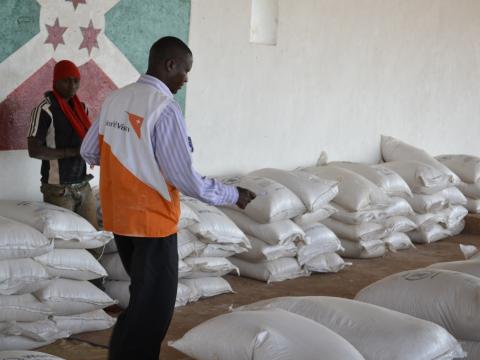Nicknamed after a banana tree

When the recent civil war broke out in Burundi, hundreds of thousands of people fled the country for their safety. More than a decade later, when the country achieved relative security, people started coming back.
World Vision supported afflicted people to settle back in their homes. Nestor Hakizimana, a World Vision Burundi food monitor, recounts how hunger remains a big concern despite the efforts made to fight against it.
It is around nine in the morning in Rutana Province, in southeast Burundi. A crowd of people is amassed around a football field. People in the crowd, most of them women, have their eyes half closed. A wind blows from south to north, stirring up dirt. Sometime later, a lively man starts calling and aligning people. He is sweating though it is still morning. He has been working since early in the morning in iron storage containers on the sides of the playground. The women become excited; the fabrics they used to carry on their backs, are now used to carry food.
“Serving people in need has become a passion for me,” says Nestor, the lively man.
He started working for World Vision in 2000 as a food monitor. When he joined World Vision, it was a hard time when people, especially children, were dying from hunger. A war was ongoing in some parts of the country.
“We were responding to a big crisis of hunger in a joint intervention,” he continues.
World Vision has partnered with United Nations and World Food Programme (WFP) to save people in danger. World Vision trained people on how to increase production through improved farming. United Nations distributed seeds and WFP supported afflicted people with food to prevent people from eating their seeds.
They were too hungry to keep the seeds, Nestor still remembers.
He is very proud of this humanitarian work. He looks around and sees how people were able to come out of the danger despite the big losses in human lives caused by hunger that period.
Sometimes you do not realise the impact a charity work makes in people’s lives. I came to know it when I realised that I was nicknamed after an improved banana tree I introduced in Karusi, [a community in northeast Burundi],” Nestor says
“People called that banana tree ‘warrior’. It had helped them to overcome hunger in many areas due its big quantity in yields. People were very excited and supportive that they gave me that same name they named the banana tree,” Nestor recounts with a smile.
Now Nestor is serving in Rutana, south of the country, again supporting people afflicted by hunger some 15 years later. The situation has not changed much. Nestor witnesses almost the same thing. People are still hungry.
“Of course people have made big efforts, but efforts eaten up by the population growth,” he says.
For example in Gihogazi, in the northeast, in a commune where he was working with 30,000 families, after the country regained security, families became 70,000.
Most of these people are returnees from Tanzania, a neighbouring country to Burundi. When the civil war recently broke out, more than 600,000 people fled. After that the country relatively regained security, many people came back, those who were still reluctant, were expelled by the Tanzanian government. Rutana province recently received successively 23,986 and 50,000 expellees and they came when drought has hit hard.
World Vision now has partnered with WFP to start its Food For Asset Project. People contribute to community development and are given food.
According to Donatien Bigiraneza, World Vision disaster reduction manager, World Vision is accompanying people to be able to reach the next farming season and be able to produce enough food for their families without external support.